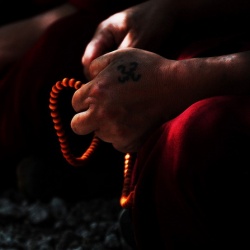The Faithful Buddhist: Taking a Lesson from Santideva
In his Siksa Samuccaya, Santideva warns against the dangers we will meet on the bodhisattva path, collecting a compendium of advice from Buddhist texts to help avoid the pitfalls of pursuing awakening. I’ve been thinking over his suggestions lately, and have decided I can’t do better than to follow them. So after this post I’m discontinuing this blog for the foreseeable future.
Santideva devotes about a third of his text to advice on protecting the self. This may seem contradictory at first, if Buddhism is understood to be devoted to the teaching of non-self; however, what Santideva has in mind here is not the purification or protection of some kind of atman. Instead, his interest is in preserving the collective enlightened mind, the mind of awakening, which is conventionally constructed in human practices, and so always faces the danger of being destroyed. It is imperative to avoid this, because of the difficulty of producing such a collective mind to begin with, and the rarity of another such mind occurring.
His advice includes avoiding bad companions of many kinds, from those who gamble and handle money, to those who engage in useless talk, to those who drink alcohol or engage in sports. It is important to “avoid showing any courtesy to” anyone who “lives by luxury,” and to avoid endless debate not seeking to uncover the truth.
He also warns us, quoting from the Upayakausalya Sutra, that we must never “impart the doctrine of emptiness to those whose minds are not prepared.” This, it seems to me, is one of the great dangers of the internet, where it is almost inevitable that those who respond to a blog will be mostly those who are not prepared to understand emptiness, and respond from fear and ignorance. In this case, trying to teach emptiness becomes like trying to teach a heliocentric model of the solar system to someone who has not yet begun to consider things like physics or mathematics. What you say seems so obviously untrue, is so clearly contradicted by one’s ordinary experience, that the response will only be that all of this abstract reasoning and excessive thinking is clearly wrong, a waste of time, over-intellectualizing, “clinging to views,” or “prapanca.” The response—that they are simply too ignorant, and too stupidly attached to their comforting beliefs, to be ready for this truth—can only be what the mainstream of Western Buddhism would denounce as “wrong speech.”
One who is prepared, of course, would not be offended by what might otherwise seem harsh or obnoxious speech—if what you say is stupid, if your argument is moronic, you would want to be told so in no uncertain terms, but only if you are ready to think clearly about the truth. Nobody prepared to handle the truth needs to be treated like a child making her first attempt at reading, and anyone at this beginning level is nowhere near ready to comprehend the truth of sunyata.
In recent months I have, almost daily, been called a variety of things, in emails, in comments I’ve rejected, and on other internet sites: asshole definitely leads the pack; second is probably prick or dick; among the mindfulness crowd, for some reason, fag and cocksucker seem to be popular with the followers of Think Not Hanh; the Theravadans prefer cunt or pussy; and, of course, the number of “mental masturbation” accusations from every crowd have gone beyond my ability to count. These, of course, are all comments from self-proclaimed x-buddhists, usually angry because I have criticized their teacher or school, and usually also including a statement that my criticism of accomplished teachers, or my liberal use of the terms moron and idiot, are not “right speech.” In defense of Think Not Hanh, a man claiming to have been a long-term resident of Plum Village emailed me that if he could find out where I lived he would come and burn my house down and murder my children; a follower of Thannissaro Bhikkhu, more restrained, only promised to “kick my ass” if he ever met me. I will pass over the irony of this kind of response, and even set aside the consideration of why so many x-buddhists find reference to bodily functions (either scatological or sexual) to be equaled as insults only by accusations of being homosexual or female. Instead, what I want to suggest is that the sheer number of these has convinced me that a blog like this cannot be of much use. I am not much bothered by these kinds of insults, but neither do I see them as useful speech, and they seem to be the most common form of speech my internet activities have generated. Santideva is right, I think, that what is “anartha,” useless or without purpose or value, unproductive, should be avoided.
There are of course many other kinds of arguments advanced, but most of them are the arguments of the moron, in the sense that Zizek uses that term in the introduction to Less Than Nothing: “the stupidity of those who fully identify with common sense.” To these, the only response can be: you are being a moron! The rest is up to them. But if one is not yet ready to encounter the delusive inadequacy of the Big Other, such a response is just as anartha as calling him a prick, asshole, etc.
What the Western Buddhist wants from Buddhism is not something I am interested in supporting; what I want to do with Buddhism, I have come to believe, cannot be done on the internet.
What does the Western Buddhist want? Well, from responses I’ve gotten here and as Speculative Non-Buddhism, as well as from what I’ve read on other websites, in Tricycle and popular books on Buddhism and what I’ve experienced in the sangha I participated in, I would say a fairly clear picture has emerged:
1) To believe that anything she already thinks is right. Everything is just a matter of opinion, and any arguing for one position over another is a sign of personal arrogance—so whatever you already think is okay, because, anyway, the real ultimate truth is beyond language.
2) To believe that anything he wants to do is okay. Because Buddhism has no rules we must follow (except that everyone is always right about everything and arguing is wrong speech, see #1). Do you make weapons of mass destruction for a living? No problem, just do it mindfully. Do you have stock in a company that employs children in sweatshops? Don’t worry, they will accumulate merit from their suffering. Do you make money by deluding people with fake psychological treatments that prey on their desperation and suffering? Don’t think too much about it, as long as you have good intentions. Remember, our eternal “true self” is unaffected by anything we do in this world, and we will go to eternal bliss when we die as long as we don’t think too much, don’t try to take political action, and have good intentions.
3) To believe she has an immortal soul that will reach eternal bliss regardless of what actions she takes in this (samsaric) world. This soul is, of course, not an “atman,” because…well, it just isn’t, that’s all.
4) To belong to a larger collective that assures him that anyone who tries to use critical thought or political action to change the world is childish, egotistical, arrogant, and is going to be reborn in this world instead of going to eternal bliss with the good Buddhists.
5) Most importantly, to get a little buzz, a kind of drug-like high, that makes it easier to avoid noticing the contradictions in the dominant ideology, and go on with the meaningless and alienated life of a subject of capitalism. So sitting with “pure awareness” of the body/breath/present moment is proclaimed as an “ideology-free” or “universal” or “non-dogmatic” practice, and the ideology of the subject it reproduces remains invisible—it becomes nothing more than a (slightly) safer alternative to robotripping.
What I’ve described should be familiar to anyone as the prevalent “postmodern” ideology of late capitalism. What Buddhism adds, for most people, is nothing more than a little additional exotic flavor, and the assurance that this is not at all a recent capitalist ideology but “ancient Eastern wisdom,” so it must be true.
What do I want from Buddhism? Well, I came to Buddhism in the naïve hope of finding a group of individuals with whom to create a collective awakening mind. I thought it would be possible to find others who were prepared to think about emptiness and conventional truth, and who would hold out no “untouchable” concept as transcendent and beyond consideration. However, for most of those I’ve encountered, the eternal truth that must never be considered is capitalism; for many others it is the existence of an eternal consciousness; for almost everyone, though, what must not be changed is the daily practice of our everyday lives within global capitalism—the study of the conventional nature of our minds must never be allowed to go so far as to change what we actually do on a daily basis, and things like meeting on a regular basis, and reading texts instead of watching baseball in the evening, are beyond the realm of the possible. Most who will accept that their minds are constructed by social practices remain unwilling to then try to change their minds by engaging in new social practices.
When I started this blog, I was hoping to mitigate some of these concerns by means of a warning and censored comments. So far, this hasn’t done much good—there has been little discussion of my posts here, and the same kind of moronic discussion of them just takes place on other sites. Also, when I began, I was hoping to get some contribution from others—I really don’t want to be a leader or teacher, but a part of a collective. Although many have mentioned writing something, to date nothing has appeared, from which I can only conclude my project is not of much real interest to others.
Given what most people want from Buddhism today, I’m not surprised. And yet, Santideva also warns us that one of the great temptations of Mara is the temptation to retreat from the world, and to seek contentment individually, in isolation. He quotes the Gandavyuha Sutra on the need to increase and improve the collective mind of awakening:
- You must be earnest for the expansion of the City of the Mind by the diffusion of boundless benevolence throughout the world. You must be earnest for the defense of the City of the Mind by aspiration for the wide shelter of the dharma and for hostility to every principle of evil. You must be earnest to throw open the gates of the City of the Mind by putting the whole world in the possession of the reality of things.
I don’t plan, then, to give up on all practice and retreat into my personal contentment. I will likely spend some of the time I have spent studying and practicing Buddhism in attempting to “open the gates” to the collective mind of enlightenment in other ways, however small and futile. I plan to finish writing a novel that will no doubt never be published, and to write a play that will no doubt never be produced. But beyond these mostly self-indulgent pursuits, I will try to start a Buddhist group that can meet in person; instead of trying to engage the Western Buddhist community and its postmodern ideological practice, perhaps there will be one or two other people, eventually, here in Connecticut, interested in collectively exploring ways to remain faithful to the Truth of the Buddhist Event.
In the meantime, I’m planning to leave this blog up, as it is, until the end of the subscription term I paid for. And if anyone’s in CT and is interested in starting a madhyamaka study group, send me an email. We can’t meet at may house, unfortunately: the Plum Village avenger might find out where I live!
Namandabu
Tom Pepper




